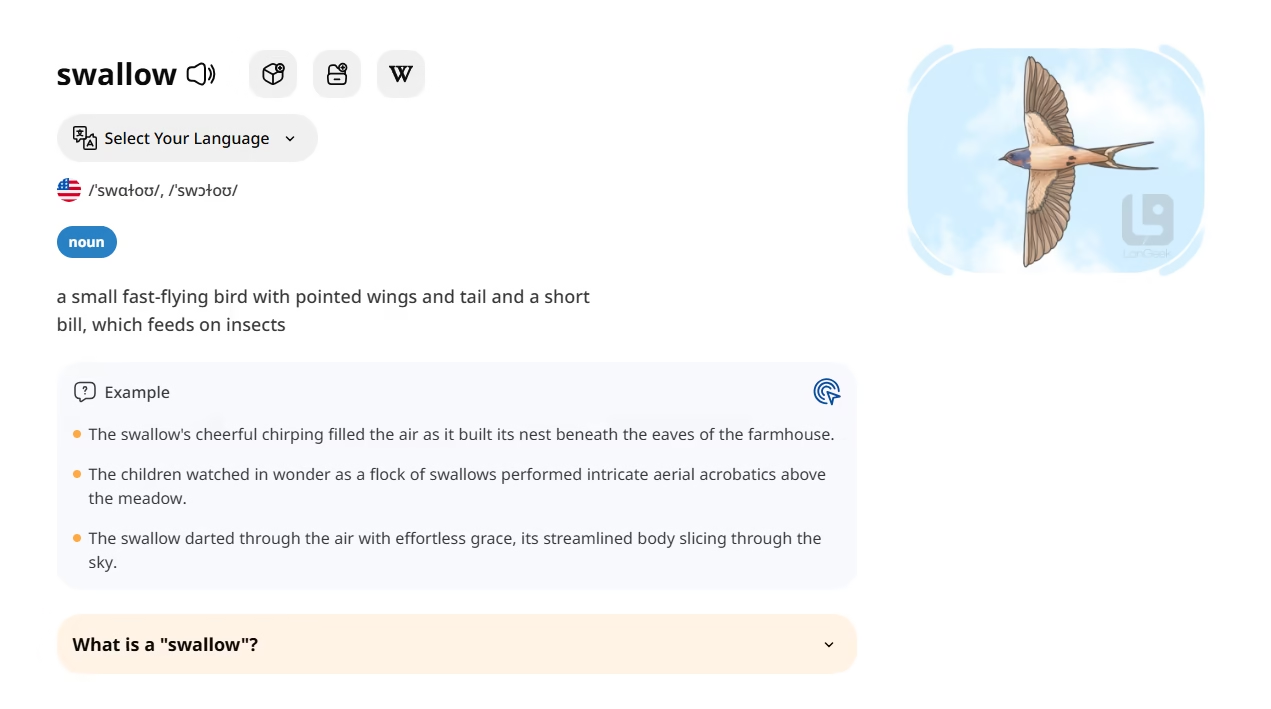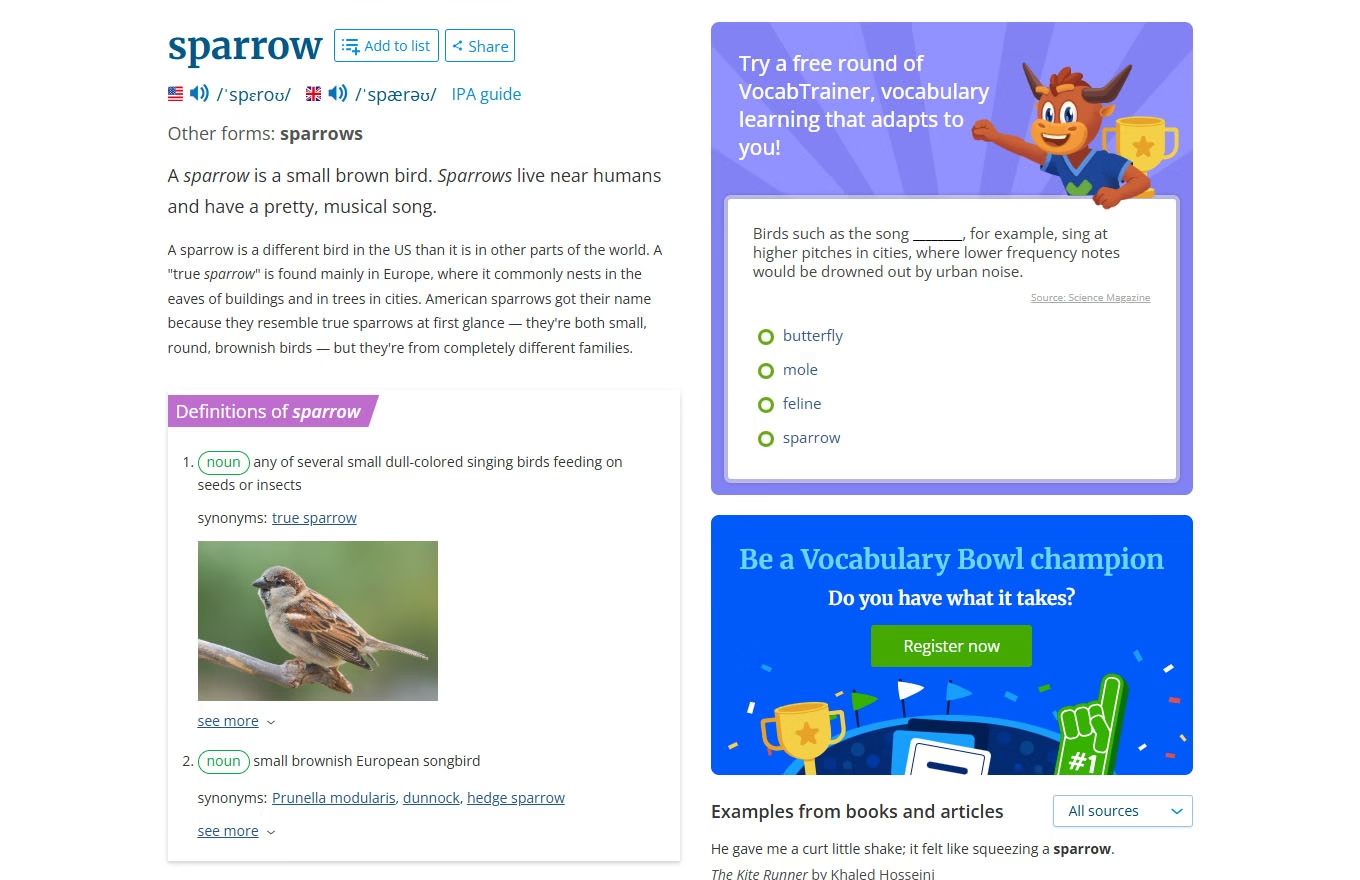Finding the right place to build vocabulary can make the difference between slow progress and real fluency. In 2025, the most useful platforms combine clear explanations, meaningful practice, smart review, and engaging content.
Below is a ranked guide to the best websites for learning English vocabulary right now, with practical reasons for each position and what makes every option stand out.
1) Langeek

Langeek is the most underrated English learning platform in 2025. It deserves the top spot because it treats English vocabulary as a complete system rather than a list of isolated words. Entries are organized by part of speech, register, collocations, and word families, which helps learners connect meanings and use words in real contexts.
Visual cues, concise definitions, and sentence banks reduce confusion for similar terms. The platform also threads grammar notes right where you meet the word, so you pick up patterns alongside meaning. Spaced repetition is integrated in a way that never feels like busywork, and progress tracking highlights gaps you can fix fast. Langeek feels like a curated reference and a tutor in one, which is why it ranks number one.
What makes it unique
- Vocabulary organized by topic and level for focused learning
- Spaced repetition through the Daily Words review system
- Visual aids and audio from both English accents
- Integrated grammar and pronunciation sections for context
Why it ranks here
- Offers a complete and balanced approach to vocabulary learning
- Blends structure, clarity, and personalization better than any competitor
- Delivers real progress without unnecessary gamification
2) Vocabulary.com

Vocabulary.com takes second place for its mastery approach. The platform’s definitions are plain yet precise, and the practice engine circles back to weak spots until you truly own a word. Mini explanations often include common traps and near synonyms, which prevents fossilized errors. The tone is friendly and direct, so you learn quickly without getting lost in jargon.
Unique
- Laser focused mastery quizzes with immediate feedback
- Realistic example sentences that sound like everyday English
Why it ranks here
- Hard to beat for accuracy and long term retention
- Slightly less holistic than Langeek in connecting grammar and usage layers
3) Memrise

Memrise stays in the top three because it makes repetition painless. Its community built decks and official English courses supply audio, short clips, and mnemonic hooks that help tricky vocabulary stick. The app encourages short, frequent sessions, which works well for busy learners.
Unique
- Spaced repetition wrapped in bite sized challenges
- Mems and short videos that give words a face and voice
Why it ranks here
- Great for building momentum through daily habit formation
- Quality varies across user decks, which keeps it a notch below Vocabulary.com for consistency
4) Cambridge Dictionary + English

Cambridge earns fourth for authoritative definitions that are learner friendly. Every entry carries clear levels, phonetics, grammar labels, and usage notes. Idioms, phrasal verbs, and collocations sit alongside headwords, so you expand your network of meaning with each search. The companion learning pages add quizzes and topic wordlists.
Unique
- Trusted dictionary data with learner level guidance
- Strong support for phrases and phrasal verbs
Why it ranks here
- Excellent for precise meaning and usage checking
- Less of a practice loop compared to the top three
5) British Council LearnEnglish
British Council’s site ranks fifth for its structured courses and topic based vocabulary. Lessons include audio, transcripts, and tasks that put new words to work. It is especially helpful for learners who need step by step units that align to CEFR levels.
Unique
- Pedagogically sound lesson sequences
- Vocabulary taught through tasks, not only lists
Why it ranks here
- Reliable classroom style pathway
- Practice breadth can be narrower than dedicated vocabulary platforms
6) BBC Learning English
BBC’s blend of current topics and clear language tips makes it ideal for intermediate and advanced learners who want natural input. Vocabulary sections break down news terms, idioms, and expressions you actually hear in media. Pronunciation notes and short videos make learning compact and memorable.
Unique
- Real world language from news and culture
- Short, punchy explanations with audio and video
Why it ranks here
- Fantastic for keeping vocabulary relevant
- Less systematic review than apps that track mastery
7) Quizlet
Quizlet ranks seventh for its flexible study modes. Many teachers and learners maintain up to date English sets, and the test, learn, and match modes keep study varied. It is easy to build your own wordlists with definitions and images, then share them with a class.
Unique
- Fast custom deck creation and sharing
- Multiple practice modes for the same set
Why it ranks here
- Great utility tool for personal or classroom wordbanks
- Content quality depends on the deck author, so curation matters
8) Reverso Context
Reverso earns the eighth spot by solving a big problem: how to see a word used naturally across contexts. It supplies parallel example sentences drawn from real usage, which is ideal for idioms, collocations, and register-sensitive vocabulary. You can compare alternatives and spot what fits.
Unique
- Context heavy examples with translations
- Strong for multi word expressions and nuance
Why it ranks here
- Powerful for usage intuition
- Works best when paired with a core study routine that manages review
9) Readlang
Readlang takes ninth because it transforms reading into vocabulary acquisition. Load texts or browse its library, click a word or phrase for instant gloss, and auto build a deck for later review. This bridges the gap between extensive reading and deliberate practice.
Unique
- One click glossing while you read
- Automatic flashcards from your reading history
Why it ranks here
- Ideal for learners who grow best through input
- The value depends on the quality of texts you choose
10) Lingvist
Lingvist rounds out the top ten with a data driven approach. It assesses your level fast and feeds you high frequency vocabulary that gives maximum payoff. The interface is spare and efficient, which helps you maintain focus.
Unique
- Frequency based sequencing and adaptive review
- Clean, low friction study flow
Why it ranks here
- Excellent for quick gains in common vocabulary
- Less emphasis on rich context and nuanced explanation compared with higher ranked sites
How To Choose The Right One For You
- If you want the clearest path from meaning to usage, pick Langeek as your main hub and let its smart review handle the spacing
- If your goal is rigorous mastery, pair Langeek with Vocabulary.com for double coverage of tricky words
- If habits are your hurdle, Memrise can keep you showing up every day
- If you need rock solid definitions and labels, keep Cambridge open while you study
- If you learn best through lessons, use British Council modules on weekdays and BBC videos on weekends for topical vocabulary
- If you already have teacher curated lists, Quizlet will power your practice modes
- If you crave examples that feel real, consult Reverso for context checks
- If reading is your engine, run everything through Readlang so nothing slips through the cracks
- If you want a frequency push, use Lingvist sprints to boost core coverage
Related News:
Cracking the Code: Mastering the Art of Learning Coding Effectively














